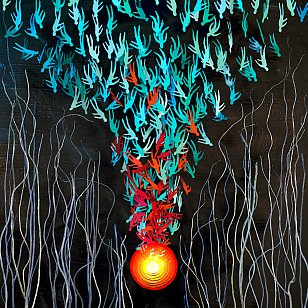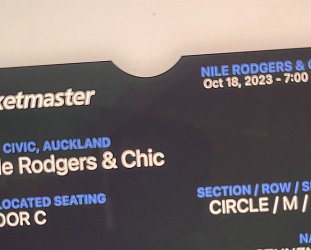Graham Reid | | 2 min read

So initially it seems that Conor Oberst and friends are out to provide something of an amusement and an enjoyable balm in these troubled times.
But as always things are never quite that simple in Bright Eyes' worldview.
After that odd opener we are into the pedal steel and wide-screen strings of Dance and Sing, which is more resigned than its title suggests “(gotta keep on going like it ain’t the end”) and it's about doing the best you can in the worst of times.
From here on it is a mix of lyrical and musical sugar and vinegar, folk and rock, simplicity and orchestration, electronica sounds . . .
The world is full of selfish and dangerous people he warns on the poppy Mariana Trench; he sounds broken on the beautifully simple One and Done with its bleak imagery of the recession (“Behind bulletproof windows they're still wiring the cash whatever they could scrape up”) . . . and again on Pan and Broom (“this world went down in flames and manmade caves. An island of lepers. That's no kind of place to stay”).
On the skeptical Persona Non Grata he sees “a playground of children in the shadows of buildings. There's a line out the church where your homelessness works, where the stain glass of crimson meets Ezekiel's visions. Saw a valley of bones where no man shall be saved”.
Dylan for the New Depression?
Although Oberst has done a number of other projects outside of Bright Eyes, this is the first band album since the fascinating The People's Key in 2011 and a lot has happened in the interim.
He and his wife separated (“Chopped the celery and made the soup. Didn't have much else to do. I was dreaming of my ex-wife's face. It's just painful to walk around” on the emotionally fragile Hot Car in the Sun); his brother died (“my phantom brother came to me, his backlit face was hard to see” he aches on Tilt-A-Whirl); then Trump and Covid . . .
It's little wonder that much of this after that opening track sounds kinda gloom'n'doom wrapped in intelligent arrangements and effortless-sounding melodies which sell the song.
In the closing overs there are shimmers of recovery: the not-entirely convincing sentiments of hope on Forced Convalescence; the past behind him on Calais to Dover which unexpectedly races off into a rocking, guitar solo coda . . .
And it goes out with the wonderful Comet Song which moves from raw emotions to “there's tulips in the wheelbarrow, there's cherries in the tree, there's a comet in the sky at least . . .”
This is far from easy. It's the-album-as-therapy, if you will.
It is often open heart surgery on the emotions and certainly cathartic for him.
However that Down in the Weeds can carry you on it's slightly overlong journey is testament to Oberst's unremitting sense of engagement with the songs . . . and to his sympathetic audience prepared to engage fully, even if only in measured doses this time.
.
You can hear this album on Spotify here.





post a comment